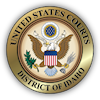 WEDNESDAY, JANUARY 21, 2026
WEDNESDAY, JANUARY 21, 2026 IMAGE: "Sawtooth National Forest - Stanley, Idaho"
UNITED STATES COURTS
District of Idaho
Clerk of Court Stephen W. Kenyon
Public 2 New

 WEDNESDAY, JANUARY 21, 2026
WEDNESDAY, JANUARY 21, 2026
The District of Idaho Clerk of Court, Stephen W. Kenyon, welcomes you to the U.S. District and Bankruptcy Courts for the District of Idaho. We are one of 15 districts in the Ninth Circuit which spans 9 western states. Idaho is proud to be one of only six consolidated District and Bankruptcy Clerks' Offices within the federal judiciary.
The U.S. Courts for the District of Idaho was created with statehood in 1890. Our offices are located in Boise, Coeur d'Alene, and Pocatello.
We trust this website will give some insight into the functions of the U.S. Courts and how the Clerk's Office can better serve the people of the State of Idaho.
The mission of the United States District and Bankruptcy Courts for the District of Idaho is to provide an impartial and accessible forum for the just, timely and economical resolution of legal proceedings within the jurisdiction of the Courts, so as to preserve judicial independence, protect individual rights and liberties, and promote public trust and confidence.
Citizens of Idaho are being targeted by phone calls threatening arrest for contempt of court, written citations, warrants for failing to comply and/or not showing up for federal jury service.
Scammers sound convincing and use real information about the victim, actual court addresses and names of federal judges or local law enforcement officers to make the scam appear more credible. Scammers may even “spoof” the phone number on caller ID so that the call falsely appears to be from law enforcement and may have police radio traffic in the background. Callers tend to have an accent, are threatening, intimidating and try to keep you on the phone. You may also be told to report to the police department to provide your signature for verification that your signature matches what is on your jury documents.
Never meet these individuals, provide cash,contact a Bail Bondsman, purchase pre-paid money cards or provide personal information. The callers are requesting hundreds to thousands of dollars and advising that your money would be refunded after the matter is taken care of and after a Zoom call with the Judge. If you do not comply with their demands, they get angry and may text or tell you that deputies are on their way to arrest you. Citizens receiving these calls can defend yourself by simply hanging up the phone.
The U.S. District Court of Idaho wants citizens to know that these calls are not from court officials. Federal courts do not require prospective jurors to provide sensitive information, nor do we call and threaten prospective jurors or request any sort of payment.
It is a crime for anyone to falsely represent himself or herself as a federal court official. Citizens receiving threatening phone calls for failure to report for jury duty should never provide sensitive information such as: credit card numbers, bank account information, social security numbers, etc. about themselves or family members.
Don’t be a victim. Hang up the phone and spread the word that scammers are actively calling citizens regarding jury service.
IF YOU HAVE ANY QUESTIONS/CONCERNS AS TO WHETHER OR NOT YOU MISSED JURY SERVICE, GO DIRECTLY TO THE FEDERAL COURTHOUSE AND SPEAK TO JURY STAFF.
Please review the below information regarding employee rights and the avenues available to report wrongful conduct.
Judicial Conduct and Disability Act
Rules for Judicial Conduct and Judicial-Disability Proceedings
Judicial Conduct and Disability Form
Contact information: